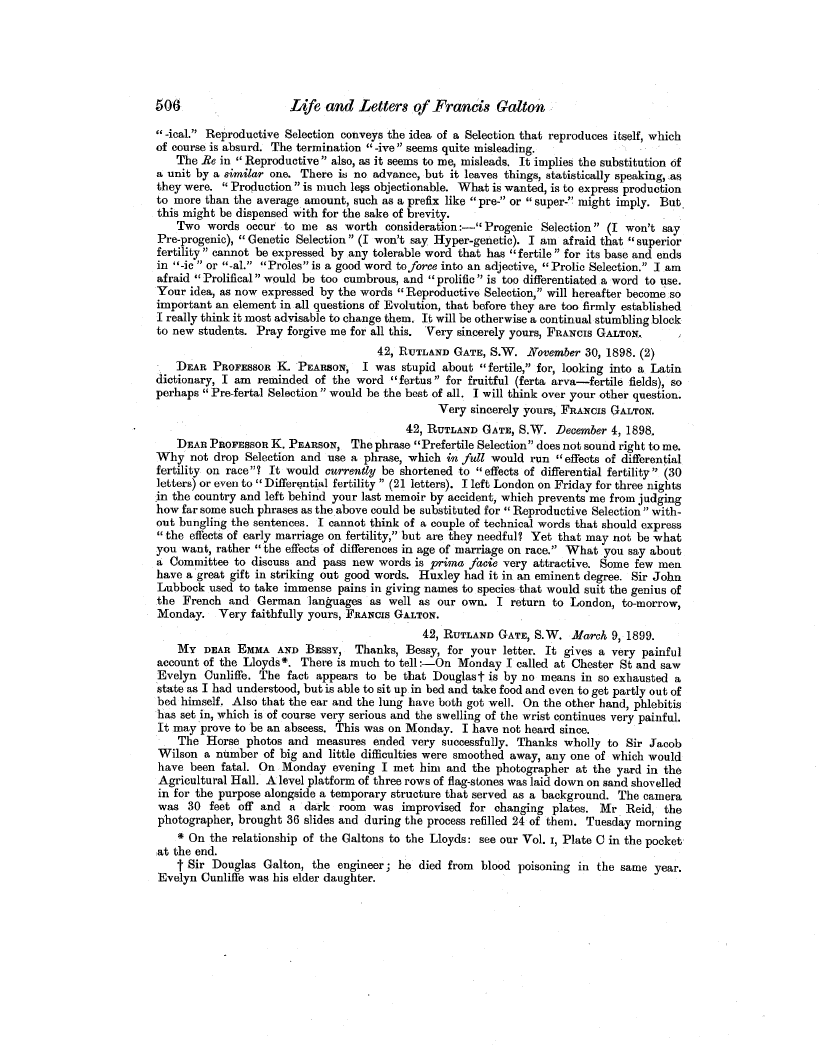| ||||||

OCR Rendition - approximate
506 Life and Letters of Francis Gallon "-ical." Reproductive Selection conveys the idea of a Selection that reproduces itself, which of course is absurd. The termination "-ive" seems quite misleading. The Re in "Reproductive" also, as it seems to me, misleads. It implies the substitution of a unit by a similar one. There is no advance, but it leaves things, statistically speaking, ;as they were. " Production " is much less objectionable. What is wanted, is to express production to more than the average amount, such as a prefix like "pre-" or "super-" might imply. But, this might be dispensed with for the sake of brevity. Two words occur to me as worth consideration:-" Progenic Selection" (I won't say Pre-progenic), "Genetic Selection" (I won't say Hyper-genetic). I am afraid that "superior fertility " cannot be expressed by any tolerable word that has `" fertile " for its base and ends in "-ic " or "-al." "Proles" is a good word to force into an adjective, "Prolic Selection." I am afraid "Prolifical" would be too cumbrous, and "prolific" is too differentiated a word to use. Your idea, as now expressed by the words "Reproductive Selection," will hereafter become so important an element in all questions of Evolution, that before they are too firmly established I really think it most advisable to change them. It will be otherwise a continual stumbling block to new students. Pray forgive me for all this. Very sincerely yours, FRANCIS GALTON... 42, RUTLAND GATE, S.W. November 30, 1898. (2) DEAR PROFESSOR K. PEARSON, I was stupid about "fertile," for, looking into a Latin dictionary, I am reminded of the word "fertus" for fruitful (ferta area-fertile fields), so perhaps "Pre-fertal Selection " would he the best of all. I will think over your other question. Very sincerely yours, FRANCIS GALTON. 42, RUTLAND GATE, S.W. December 4, 1898;. DEAR PROFESSOR K. PEARSON, The phrase "Prefertile Selection" does not sound right tome. Why not drop Selection and use a phrase, which in full would run "effects of differential fertility on race"? It would currently be shortened to "effects of differential fertility" (30 letters) or even to "Differential fertility " (21 letters). I left London on Friday for three nights in the country and left behind your last memoir by accident, which prevents me from judging how far some such phrases as thee above could be substituted for " Reproductive Selection " without bungling the sentences. I cannot think of a couple of technical words that should express " the effects of early marriage on fertility," but are they needful? Yet that may not be what you want, rather "the effects of differences in age of marriage on race." What you say about a Committee to discuss and pass new words is prima facie very attractive. Some few men have a great gift in striking out good words. Huxley had it in an eminent degree. Sir John Lubbock used to take immense pains in giving names to species that would suit the genius of the French and German languages as well as our own. I return to London, to-morrow, Monday. Very faithfully yours, FRANCIS GALTON. 42, RUTLAND GATE, S. W. March 9, 1899. MY DEAR EMMA AND BESSY, Thanks, Bessy, for your letter. It gives a very painful account of the Lloyds*. There is much to tell:-On Monday I called at Chester St and saw Evelyn Cunliffe. The fact appears to be that Douglas's is by no means in so exhausted a state as I had understood, but is able to sit up in bed and take food and even to get partly out of bed himself. Also that the ear and the lung have both got well. On the other hand, phlebitis has set in, which is of course very serious and the swelling of the wrist continues very painful. It may prove to be an abscess. This was on Monday. I have not heard since. The Horse photos and measures ended very successfully. Thanks wholly to Sir Jacob Wilson a number of big and little difficulties were smoothed away, any one of which would have been fatal. On Monday evening I met him and the photographer at the yard in the Agricultural Hall. A level platform of three rows of flag-stones was laid down on sand shovelled in for the purpose alongside a temporary structure that served as a background. The camera was 30 feet off and a dark room was improvised for changing plates. Mr Reid, the photographer, brought 36 slides and during the process refilled 24 of them. Tuesday morning * On the relationship of the Galtons to the Lloyds: see our Vol. t, Plate C in the pocket at the end. t Sir Douglas Galton, the engineer; he died from blood poisoning in the same year. Evelyn Cunliffe was his elder daughter.
|